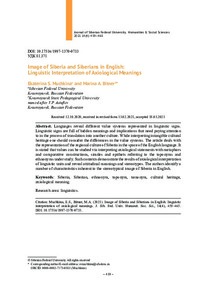Image of Siberia and Siberians in English: Linguistic Interpretation of Axiological Meanings
Скачать файл:
URI (для ссылок/цитирований):
https://elib.sfu-kras.ru/handle/2311/141246Автор:
Muchkina, Ekaterina S.
Bitner, Marina A.
Мучкина, Е. С.
Битнер, М. А.
Дата:
2021-04Журнал:
Журнал Сибирского федерального университета. Гуманитарные науки. Journal of Siberian Federal University. Humanities & Social Sciences 2021 14(4)Аннотация:
Languages reveal different value systems represented in linguistic signs. Linguistic signs are full of hidden meanings and implications that need paying attention to in the process of translation into another culture. While interpreting intangible cultural heritage one should consider the differences in the value systems. The article deals with the representation of the regional culture of Siberia in the space of the English language. It is stated that values can be studied via interpreting axiological statements with metaphors and comparative constructions, similes and epithets referring to the toponyms and ethnonyms under study. Such contexts demonstrate the results of axiological interpretation of linguistic units and reveal attitudinal meanings and stereotypes. The authors identify a number of characteristics inherent to the stereotypical image of Siberia in English В языках обнаруживаются различные системы ценностей, представленные
в языковых знаках. Иными словами, лингвистические знаки полны скрытых
значений, на которые следует обращать внимание в процессе трансляции в другую
культуру. Признание культурной специфики ценностно-смыслового
содержания
языковых знаков привело к осознанию необходимости интерпретировать культурное
наследие с учетом особенностей аксиологических систем различных языков. В статье
рассматривается репрезентация региональной культуры Сибири в пространстве
английского языка. Утверждается, что ценности можно изучать, интерпретируя
аксиологические суждения, содержащие метафоры и сравнительные конструкции,
сравнения и эпитеты с исследуемыми топонимами и этнонимами. Такие контексты
демонстрируют результаты аксиологической интерпретации языковых единиц,
помогают выявить аксиологические значения и содержательные характеристики
стереотипного образа Сибири и сибиряков

